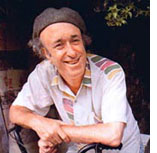By Dan Bloom

CHIAYI CITY, Taiwan –When I spoke to my professor friend Edward L. Rubin earlier in the year about a novel he was writing titled The Heatstroke Line, he told me an interesting story about the plot he had devised.
Rubin, who is Jewish and grew up in Brooklyn, has always been passionately interested in issues such as social justice and human rights, as well as the the environment and law.
This summer he traded in his academic cap temporarily for a novelist’s hat, and
the result is a story set about 150 years from now when Canada has assumed control of North America, taking Alaska into its fold and hauling tons of Midwest soil over the old border to use for agriculture in what what is now a very temperate and warmed over Canada.
Sounds implausible? That’s the nature of fiction, and Rubin told me he wanted to shake things up a bit with a plot that would be sure to captivate Canadian readers and perhaps prod American readers to think harder about global warming issues before it’s too late.
The book will be published by Sunbury Press on September 1.
The story takes place in the near future when global warming has made much of the Earth uninhabitable, Rubin told San Diego Jewish World in a recent email. “But the result isn’t some ‘Mad Max’ wasteland. Instead, the U.S., suffering from the heat, has broken apart into three small, weakened nations which are all dominated by Canada, which has taken over Alaska and New England and transported the topsoil from the American Midwest to Canada’s newly temperate arctic regions.”
The American South has become so hot that it is barely inhabitable, especially below the so-called “heatstroke line,” which is basically the old border line between the North and the South in the U.S. Civil War of the 1860s. In addition, the South is afflicted by savage, flesh-eating bugs called “biter bugs” that have developed as a result
of the climate change.
Rubin told me he wrote the novel partly as entertainment and partly as a wake up call for climate denialists.
“Why are so many people prepared to jump on the denial bandwagon?” Rubin asked. “One answer might be that government officials in Canada and America cannot face the possibility of nationwide or worldwide disasters. Proponents of global warming, it could be argued, have predicted a future that is just too grim to contemplate.”
But Rubin said he didn’t create the plot to irritate Canadians or Americans.
“The geopolitical elements of the story just came to me, and I wrote it down that way,” he told me.
Some quotes from the novel shed some light on the friction that develops in the novel between Canada and
the former Lower 48 states which are now divided into three separate, desperate regions.
One character in the book says to a lab colleague: “It took three years for them to transport all that Midwest topsoil to Canada, even with those giant trains. Just think, three years of ripping the surface off seven states.”
“Well, we did drop nuclear bombs on two of their largest Canadian cities,” says the colleague in return.
While Rubin’s sci-fi novel is just fiction, the story might serve to re-align the way readers currently see geopolitics in North America, even today.
*
Bloom, based in Taiwan, develops stories from all over the world through email interviews. He may be contacted via dan.bloom@sdjewishworld.com
Pingback: Novelist predicts war, chaos in wake of climate change - San Diego Jewish World